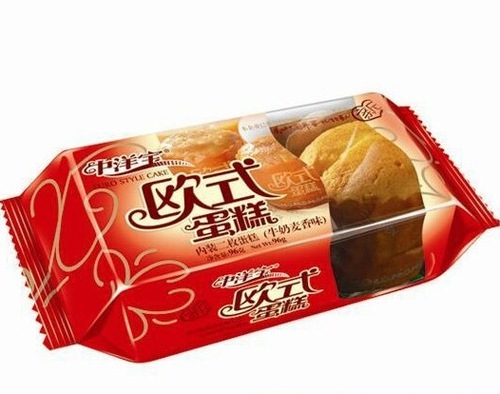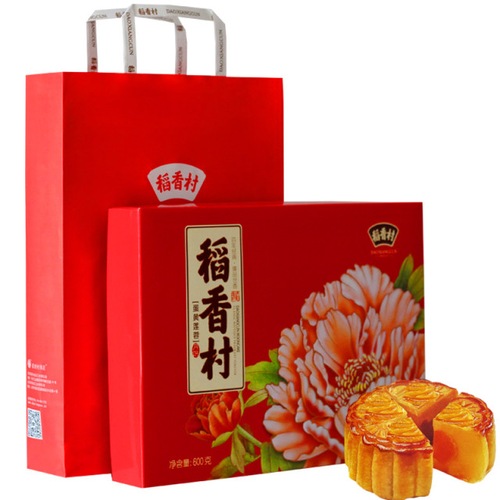(Minghui.org) They get up at 5:45 AM every day to start work at 6. Some of them even jump out from their beds directly to work to glean a few more minutes of precious sleep. There's no running water until 7:30, so the toilets are always filled with a putrid smell.
These toilets also happen to be in the same cells in which “employees” work at making packaging for various food items, the same cells in which they sleep and eat. Day in and day out, they work in this dusty, filthy environment and breathe the toxic air, made poisonous by the glue they use.
It is very hard to link such dangerous working conditions to contemporary society, but at the Qinhuangdao Detention Center, these conditions are an absolute reality for the inmates. Located in Hebei Province, adjacent to Beijing, the detention center produces various food packages of several renowned brands in China.


 Deluxe food packages produced at the Qinhuangdao Detention Center. These three brands shown are from companies headquartered in Tianjin, Shanghai, and Beijing, respectively.
Deluxe food packages produced at the Qinhuangdao Detention Center. These three brands shown are from companies headquartered in Tianjin, Shanghai, and Beijing, respectively.
Long Working Hours and Intensive Labor
Located in Haiyang Town northwest of Qinhuangdao City, the Qinhuangdao Detention Center holds over 1,000 detainees, including nearly 20 Falun Gong practitioners. All of them are forced to work without pay.
From October of 2013 to February of 2014, the working hours went from 6am to 7-8pm, every day including weekends. When the assignments were heavy, they were extended to 10pm or later. Detainees were sometimes forced to stand for two or three more hours before going to bed—a routine referred as “being on duty.” As a result, some detainees go to bed as soon as they are allowed to, without cleaning or washing themselves. National holidays were deemed working days, including New Year's Eve.
From 2011 to 2013, the detention center had to produce a special packaging material for a company in Southern China. To make this material, detainees had to overlay a very thin tin sheet over a piece of brown paper, both of A4 size, align them manually, and press them with a roller back and forth until the two layers were combined into one sheet, without any tears or wrinkles.
Each detainee was assigned 1,700 sheets every day. Anyone who failed to finish their sheets was deprived of sleep and forced to stand for a long time. Such repetitive labor caused severe pain in the lower back, spine, and wrists. Excessive exposure to the tin sheets that they used also led to skin erosion due to their toxicity, leaving large areas of marks on the arms.
Another assignment involved making paper cups for cake production. Male detainees were assigned at least 3,000 cups per person each day, while female detainees received more varied assignments, from 1,000 to 2,000 or more – in one female cell guards had even assigned over 4,000 cups per person each day. This long, intensive labor with no breaks made many people cry out of fatigue. Their hands were often shivering, even during non-working hours.
Similar to the tin sheets above, the glue used to make these paper cups is also toxic, which burned skin and left bruises on fingers. To speed up the drying process, all the windows are left open, and as a result the low temperature on winter days often led to severe pain in the legs and feet. During the summer, the cells are often humid and hot because no air conditioning or fans are made available.
Despite the poor working conditions, practitioners are forced to work without exception. When practitioner Ms. Li Lili refused the forced labor, guards spayed chili water mixture onto her face. They also moved practitioner Ms. Zhao Guohua to a cell with a heavier work load after she opposed the forced labor. Ms. Zhang Xiaojie, a practitioner who honestly answered a questionnaire from the Qinhuangdao Procuratorial Office, met with severe retaliation. Officer Hu Wei cuffed her hands, chained her feet, and left her in the hallway for two weeks.
 Torture illustration: Hands cuffed and feet chained
Torture illustration: Hands cuffed and feet chained
Terrible Working Conditions
Food at the Qinhuangdao Labor Camp is abysmal: a stale steamed bun for breakfast and dinner, and two of those buns plus a bowl of cabbage soup for lunch. The buns are coarse and hard to swallow. The soup has almost no cooking oil, let alone any spices. However, the posted menu in the dining hall—shown to visitors or inspectors—lists dishes such as fried eggs with tomato and stewed tofu.
Malnutrition takes a toll on the detainees' health, making them weak and emaciated. Special dishes are indeed available for purchase, but few detainees could afford them: each item costs over 30 yuan, and to eat like that regularly would add up to around 1000 yuan per month—the average wage of a small city worker.
Other aspects of living in the detention center are not much better. Although the tap water is not potable, detainees have no choice but to drink it anyway. The water, often salty for unknown reasons, is also used for cleaning, showering, and washing clothes.
Nonetheless, access to water is a luxury, as it is available only in the early morning and evening. The prices for soap is also exorbitant: 5 yuan for laundry soap and 7 yuan for hand soap. But their low quality—a lack of bubbling and inefficiency in removing stains—makes many believe they are fake merchandise.
Break time is also reduced to maximize profits. The Hebei Province Prison Administration Bureau requires two 30-minute-breaks a day for detention center detainees, but this policy is often ignored. When the workload was heavy, such as between October 2013 and April 2014, the detainees were only allowed one 20-minute break per day.
What It Means to Consumers
These packaging materials, made by forced labor in this unsanitary environment, are directly used to wrap cupcakes, desserts, or other food products without being further cleaned. The same chemical residue that poisons the detainees are hidden in the food packaging that consumers touch when they open their food.
While many people enjoy these tasty name-brand food items, very few are aware of the forced labor or unhygienic conditions behind them, and the harm they bring to both the worker and the consumer
Contact information of Qinhuangdao Detention Center:Haiyang Town of Qinhuangdao City, Hebei 066000, P.R.ChinaDetention Center director: Li Huaxing (李化兴), +86-335-7827597, +86-335-7827593, +86-15903396969





